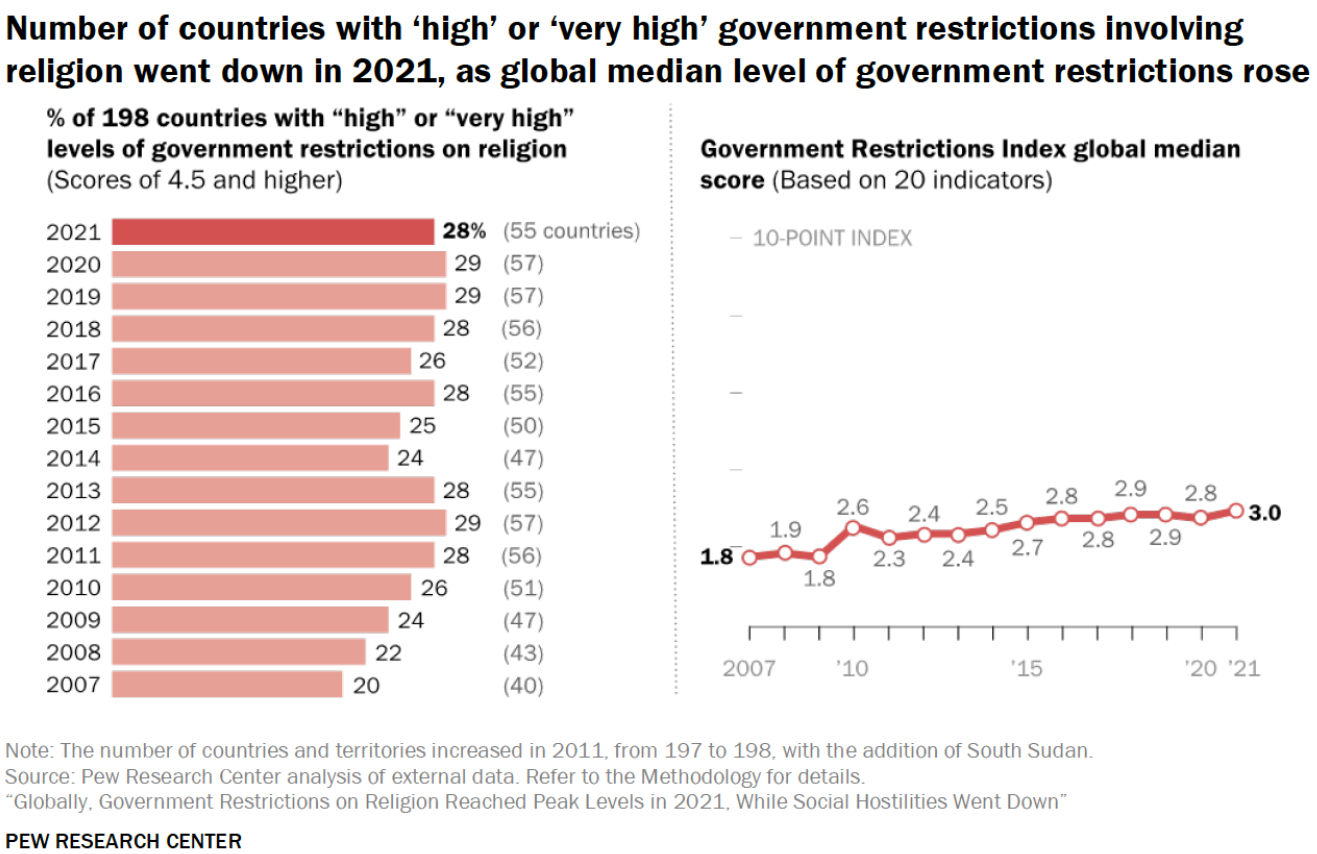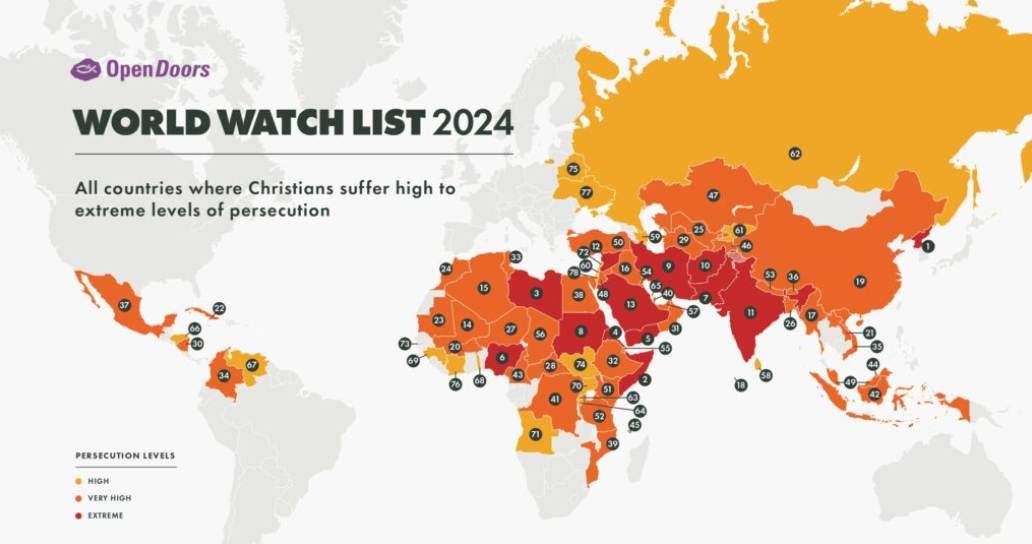Every year since 2007, the Pew Research Center studies Christian persecution because, although freedom of religion and expression is permissible in the States, certain countries around the world have a much different opinion on Jesus’ role in our lives.

The scale is based on two 10-point indexes: Government Restrictions (GRI) and Social Hostilities (SHI).
A March report found “the global median level” of its Government Restrictions Index went up to 3.0, with 28% of countries surveyed enforcing “high to very high” levels of government restrictions on religion.
Pew labels “government restrictions” as banning particular faiths in its country (particularly Christianity), prohibiting proselytizing and conversion, and limiting preaching times.
Another global organization dedicated to raising awareness about Christian persecution is Open Doors. Each year, the not-for-profit group develops its “World Watch List.” They have found one in seven Christians (365 million) are persecuted worldwide, with one in five living or incarcerated in Africa and two in five in Asia.
Other harrowing statistics they uncovered about Christian persecution are:
- 4,998 Christians were murdered for their beliefs in 2023
- In that same time, 4,125 Christians were “detained”
- And 14,766 churches or Christian properties were “attacked”
- Almost 300,000 Christians were “displaced” from their places of worship
We looked at the World Watch List to determine the top 10 countries with the most Christian persecution, whether unchecked or permitted within its borders.
Countries with the Most Christian Persecution

Its metrics relate to three levels of religious restrictions across seven distinct areas that Christians in foreign lands face daily. Persecution levels range from high, to very high, and extreme. Facets of life include:
- Violence
- Private Life
- Family Life
- Community Life
- National Life
- Church Life
Open Doors defines Christian persecution as hostility in any fashion resulting from witnessing the truth of Jesus Christ.
“That hostility can look different for each of the millions of believers who face persecution every day. Some experience rejection and isolation from their families, friends and communities. Others are denied access to basic needs like water, food and health care. Some face violent abuse, imprisonment and even death.”
Open Doors, “What is Christian Persecution,” accessed March 2024
Most of the countries in the Top 10 list are in Africa, which is known for its heinous treatment of Christians. Many stories come from China regarding religious restrictions, but the People’s Republic ranks 19.
Closer to home, Christian persecution is seen in Cuba (22), Nicaragua (30), Columbia (34), and Mexico (37).
10. Afghanistan
With the return of the Taliban in Afghanistan, it is a higher risk to proclaim faith in God. According to Global Christian Relief, one government ministry said Afghan officials will “cut any Christian [they] find into pieces.” Both tribal customs and blood feuds are said to exacerbate public sentiment against believers.
9. Iran
Open Doors says, “[Iran’s Islamic] government views conversion as an attempt by the West to undermine Islam.” Armenian and Assyrian Christians are permitted a faith in Christ, but they will forever be “treated as a second-class citizen.” Furthermore, faith is only permitted so far, as Christian conversions are deemed “illegal” and punishable by prison or worse.
8. Sudan
One of the highest countries in Christian violence is Sudan, with 2.5% of the country with Christian beliefs. Pastors are arrested. Men and boys are beaten. And young girls and women are sexually assaulted. The country’s various military regimes police ethnic and religious crimes with an iron fist.
7. Pakistan
Christians make up 1.8% of the Pakistani population, yet converts and missionaries live in fear daily. One incident in August 2023 was a calculated, government-led campaign that destroyed over 20 churches and 100 homes in response to “two believers had desecrated the Quran.”
6. Nigeria
Although sixth on the list, Open Doors cites Nigeria “accounted for 9 of 10” murders in the country to be “religiously motivated.” On a grim note, 82% of those Christian murders worldwide occurred in Nigeria. Many of those murders are considered egregious acts of torture and punishment where the believer died as a result.
5. Yemen
Yemen, the southernmost country in the Arabian peninsula, has faced a decade-long civil war. At its core are Christians, both denizens and converts. Faith outside of Islam is strictly prohibited, particularly displaying Christian images, which local mosques and Houthis (an armed rebel movement) find offensive and sacrilegious.
4. Eritrea
Dubbed the “North Korea of Africa,” this small, far eastern African country actually allows Christian worship but only recognizes three denominations–Eritrean Orthodox, Roman Catholic, and Lutheran. For Christians labeled as “Protestants,” they face intense scrutiny and imprisonment for years.
3. Libya
While violence may be at 61% against believers, Libyan nationalists and military factions plague five areas of life in an “extreme” fashion, as noted in the Open Doors research. Additionally, the Libyan National Army targets its own citizens who have converted to Christianity.
2. Somalia
Open Doors notes the difficulty of measuring Christian persecution among Somalia’s 17 million because Christ-followers have to live in secrecy. Known for its Islamic militants, Christians work to defy the odds of burning churches, capturing families, and killing believers.
1. North Korea
The totalitarian country, led by Kim Jon Un, ranks “Extreme” in every category. Becoming known as a Christian in the eyes of the fascist government is grounds for death. With some of the most stringent restrictions for crossing its border, North Korea makes it almost impossible for Christian citizens and converts to flee and receive support from any country.


